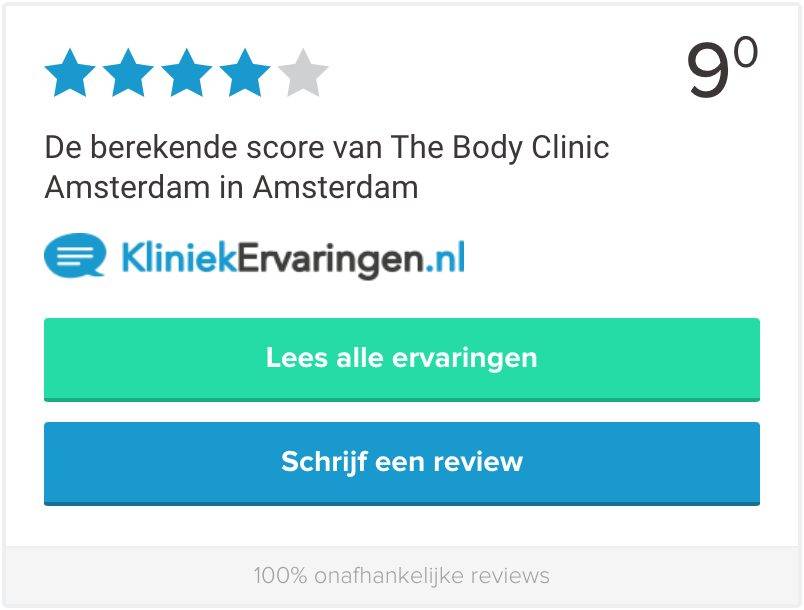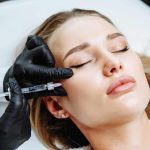Our doctor Nicoline Nijman was featured in Villa d’Arte magazine with an extensive article on the safety of Botox and fillers. Read the article below:
Are Botox and fillers really safe?
How innovations and experienced doctors are taking the safety of treatments at The Body Clinic to the next level.
The cosmetic clinic The Body Clinic celebrates 15 years this month quite a long time in an industry that began only 20 years ago. By focusing particularly on Botox and fillers for 15 years, The Body Clinic has become a leading clinic in the Netherlands. The Body Clinic is “Tested as Best” by the Consumers’ Association and ranks first on comparison website Kliniekervaringen.nl with a 9.0 and over 2,000 experiences as “Best Guaranteed Cosmetic Clinic.”
The clinic’s good name comes not only from the results the doctors achieve with injectables; the clinic is also known for its safety and innovation. By using innovative tools, The Body Clinic has managed to minimize the risk of complications for its clients more about that later.
Botox and fillers: no longer taboo
Previously, there was still a taboo on undergoing treatment with Botox or fillers. You were associated with the American “plastic fantastic” look. That taboo is completely off and the market has become a lot more mature. The goal of cosmetic treatment is to make a person look just a little fresher and healthier, without being conspicuous. With this approach, cosmetic treatments are increasingly disappearing from the taboo.
Filling wrinkles or other areas of the face with temporary fillers has grown considerably in popularity in recent years. Research by Erasmus MC shows that as many as 1 in 50 women in our country has had treatment with fillers or botox, and this number is only increasing.
Safety first
We are increasingly finding it important to invest in natural beauty, whether to age more gracefully or to emulate a certain beauty ideal. One thing is paramount, and that is that it must be done safely.
Due to the tight regulations in the Netherlands, these treatments are going relatively well in our country compared to abroad. Physicians can specialize in the Netherlands as Cosmetic Physicians KNMG. As of 2019, “Cosmetic physician” is a protected title and, for example, general practitioners or “ancillary” dentists may no longer call themselves cosmetic physicians. This makes it easier for clients to choose a good doctor.
“At The Body Clinic, we try to do everything we can to put safety first and also to keep the
realistically discuss expected treatment outcome with our clients. In my opinion, celebrities should use social media to highlight the possible complications and associated safety issues of injectables and not give people a heads up,” said cosmetic physician KNMG Nicoline Nijman.
Nicoline Nijman explains, “The cosmetic market is going through tremendous development. People no longer have to be embarrassed and take a week off from work for filler treatment.
Young people are vulnerable
That fillers and Botox are disappearing from the taboo realm also has a downside. Young people can
bear the brunt of this. This vulnerable group particularly draws inspiration from social media channels. On social media, filters on photos ensure that the beauty ideal has become unreal. In addition, celebrities flaunt their beauty, showing off their unnaturally large lips, for example. I think my job as a cosmetic doctor is to protect young people. I prefer to sell ‘no’ or recommend a less invasive treatment when young people go ‘over the top.'”
Fillers were already safe, right?
Nicoline Nijman: “The popularity of injectables is enormous and price-fighters have entered the cosmetic market. There is nothing wrong with that in itself, of course, as long as the low prices are not at the expense of client safety. This is he laas not always the case. The focus is often on keeping costs down rather than client safety and achieving natural results. Clinics hire inexperienced doctors whose job is to inject as much product as possible. Little to no attention is paid to the risks of treatment, with all of the consequences. Complications grow disproportionately and cosmetic treatments are unfairly given a bad name.”
In the Netherlands, cosmetic treatments only allow the use of temporary fillers. Permanent fillers (not soluble) can cause serious complications far causes that cannot be corrected. Consequently, the use of permanent fillers has been banned in the Netherlands since 2015. Today’s temporary hyaluronic acid fillers have the wonderful property that they can be dissolved.
Nicoline Nijman on the danger of fillers and blood vessels: “Temporary fillers based on hyaluronic acid have been found to be safe, provided you use them correctly. Should this not be the case, a temporary filler can cause permanent complications. If you inject a filler into a blood vessel, the blood vessel will be occluded; this is called vascular occlusion. The skin cells in that area then die. To this day, we are looking for ways to perform filler treatment even more accurately and safely to minimize long-term and temporary complications. At The Body Clinic, we have used a number of tools to do this with good results. A DNA test to see if a client is predisposed to complications and an MRI scan to map the arterial network.”
ARtery3D – Technology to map the arterial network
Today’s technology is growing along with the possibilities of increasing the safety of filler treatments.
The Body Clinic has joined forces with Belgian startup Augmented Reality. Earlier this year, they launched ARtery3D, a technology that can display the complex arterial network on the client’s face by undergoing an MRI before the filler treatment. “Every client is unique and so is their anatomy. This product allows us as doctors at The Body Clinic to inject fillers even more accurately and to minimize risks of arterial complications. A nice bonus is that temporary complications such as bruising and pain can also be reduced through the use of ARtery3D,” said Nicoline Nijman.
DNA test helps prevent complications
In general, most people enjoy their fillers. If things do go wrong, the fingers are often pointed at the doctor who placed the fillers, but it can also happen that the body itself has an immune reaction to the fillers, something that the practitioner basically cannot do anything about.
Nicoline Nijman: “These are people in whom the immune system reacts abnormally to the filler and rejects the filler. This can result in long-term pain, misery and sometimes permanent damage to the face. At The Body Clinic, we are one of the first clinics in the Netherlands to deploy a high-quality DNA test from Bsure to test whether a client is at this risk.”
The team at Bsure has conducted more than 6 years of scientific research on the relationship between fillers and complications. This study found that a combination of two specific genes can lead to an increased risk of complications after filler treatment. “For the Bsure DNA test, all you need is a little cheek swab; the test will then reveal if you have this particular gene combination. Should the result be positive, it is strongly discouraged to proceed with filler treatment. You will then be spared the misery! Complications don’t just come from incompetent doctors. You can have the best doctor with a lot of experience who uses the best products, but how your body reacts to injectables you don’t know in advance,” says Nicoline Nijman.
Close collaboration with the Netherlands’ leading complication physician
“At The Body Clinic, we make every effort to minimize complications from injectables. Completely avoiding complications is unfortunately not yet possible. If things do go wrong, a doctor from The Body Clinic always consults directly with the complication doctor in the Netherlands, Dr. Tom Decates,” says Nicoline Nijman.
Dr. Decates holds a doctorate in the field of complications from injectables, making him a founder in the field of scientific research within cosmetic medicine. Should the need arise, a client with a complication will be referred to the complication clinic at Erasmus MC. The Netherlands is the only country in the world blessed with a complication clinic specifically for injectables.
In short, there are many developments in the field of injectables safety. To make this manageable for the normal consumer, The Body Clinic has created a checklist for selecting a safe clinic and doctor. It is based on the principle that both the doctor and clinic must be good, the product must be safe and your body must be suitable for the treatment.
Your checklist for safe botox and filler treatment
Choose the right doctor and clinic
1. Check to see if your doctor and clinic are affiliated with the NVCG, the professional trade association of the cosmetic industry.There are a number of other smaller ones associated, but NVCG is the strictest and leading in its protocols regarding safety. Physicians can also become accredited KNMG physicians if they have completed sufficient skills and continuing education. Ask about it at the clinic or look it up on the NVCG nvcg.co.uk website. All doctors at The Body Clinic are affiliated with the NVCG and most are KNMG doctors.
2. Check doctor and clinic reviews. The leading site for this is Kliniekervaringen.nl, an independent website to which most doctors are affiliated. There you can see the experiences of other customers for each operation.
3. Check that the same doctor provides the in take, treatment and any free aftercare. This is not standard at all clinics, but it is safe. Don’t settle for doctor’s aides or no free checkups at all. The doctor must be BIG registered; this is usually listed on the website.
Choose safe products
4. Check what products are used. Choose A-brand products with which millions of treatments have been performed and whose safety has been proven. There may be a difference in the safety and complication probability of the product. Many times the more expensive brands are the safest, though.
Test if your body is suitable for Injectables
5. If you have never used fillers before and are predisposed to allergic reactions, there is a chance that your immune system may react violently when fillers are applied for the first time. This is one of the most common and annoying complications, which was previously difficult to prevent. The Bsure DNA test can reveal whether you have this genetic predisposition.
6. It is also wise to use a relatively small volume of fillers during the first filler treatment, so that any foreign body reaction is still easily treatable. The Body Clinic has strict protocols to minimize this complication. Ask your doctor about it.
7. Map your vessel network with the latest 3D technology and prevent your doctor from hitting an important vessel during treatment.
Want more information about safe injectables treatment? Then schedule a free consultation now with cosmetic physician KNMG Nicoline Nijman of The Body Clinic.










